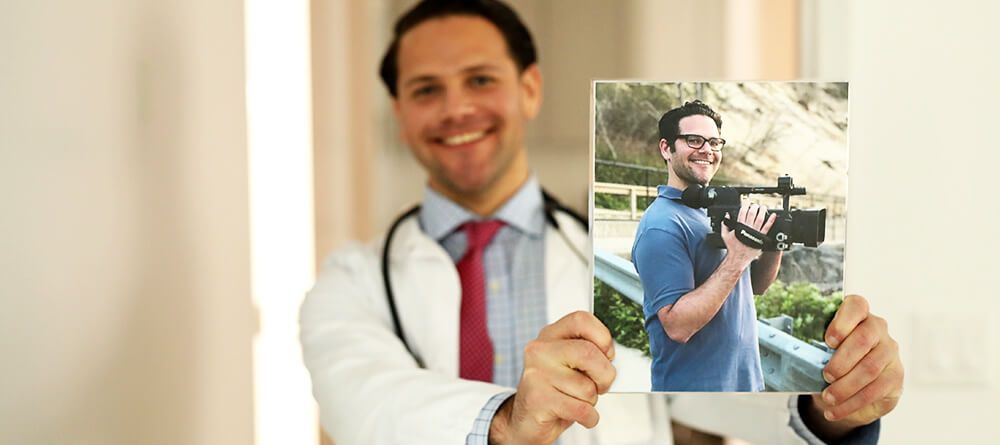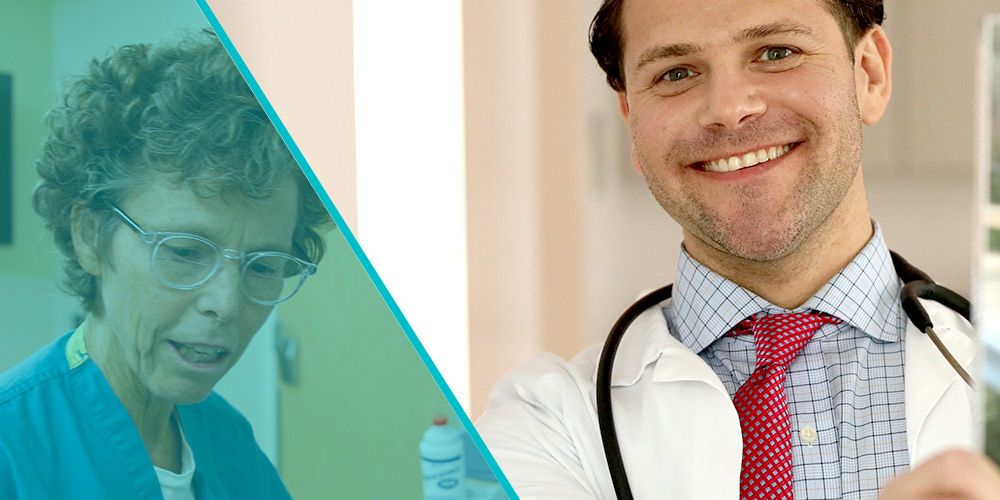Pursuing a career in medicine is one of the most meaningful decisions a person can make. For some, that journey begins a little later in life. At SGU, students from all backgrounds are welcomed and supported, including career-changers.
Whether they switched careers, rediscovered a lifelong dream, or found a new calling, these St. George’s University School of Medicine graduates prove that becoming a doctor is possible at any stage.
1. Finding a new way to serve her country
As an elite Air Force pilot, Cholene Espinoza, MD ’15, had already achieved extraordinary things in her chosen career. After retiring from the Air Force, she worked as a commercial airline pilot. But in the aftermath of 9/11, she was moved to serve her country again as an embedded journalist covering the Iraq war.
It was during this pivotal experience—seeing medics saving lives on the ground instead of observing from the sky—that convinced her to make the career change to medicine at the age of 45. Even with her steely nerves and experience staying calm in high-pressure situations, the road to becoming an obstetrics & gynecology doctor wasn’t a walk in the park.
“I would say that residency training and making this switch has been the biggest challenge of my lifetime but really the privilege of a lifetime,” says Dr. Espinoza, who is an intensivist in Cleveland Clinic’s Surgical Intensive Care Unit and an OB/GYN. “My life has a lot more meaning now.”
The military may have been her common denominator, but Dr. Espinoza loves the work she does at Cleveland Clinic.
“Every day I’m exposed to patients who are literally struggling for their lives. The kind of courage and suffering they go through with their families is a tremendously humbling experience,” Espinoza wrote in an op-ed for People magazine. “You don’t have to be perfect or go in a certain path or have perfect timing. I think setbacks are temporary, and they certainly made me a better physician and a better human being.”
2. Fighting for his patients
Before he wore a white coat to work, Anthony McDonald, MD ’13, spent his time competing for championship belts as a mixed martial arts fighter. But he turned in his mixed martial arts championship belt to pursue his dream of becoming a physician. He is now a hospitalist at Shannon Medical Center in San Angelo, TX.
“What I used to do with fighting and training, it really ingrained in me the discipline that I needed and the structure that I needed to be successful,” Dr. McDonald says. The energy and dedication he used to succeed at MMA was an asset to him as a medical student.
“When I went back to school, I went back with the same fervor and zeal I did with fighting,” Dr. McDonald says. He also had positive role models in the medical field: his father is a doctor, and his mother is a nurse.
To make a career change to medicine though, it’s not enough to be physically strong—you also must be mentally resilient.
“Medical school is tough; there’s no two ways about it,” he admits. “But I was very fortunate to do it at St. George’s University, where I felt that the entire island is set up to make you succeed.”
3. Trading his camera for a white coat
Going from behind the camera to working face-to-face with patients may seem like a stretch for some, but for Benjamin Kahn, MD ’20, it was just a leap of faith. He left behind an Emmy Award-winning producing career to study medicine and has absolutely no regrets. Today he is a dermatologist in Georgia.
Dr. Kahn traces his turning point back to a surgery and subsequent hospital stay that triggered unexpected emotions.
“I felt vulnerable. I had never really hurt myself before, and it was a very difficult recovery,” he reflects. “My doctor was very integral in making a real difference in my life.”
He goes on to explain how he built a relationship with his physician, which led Dr. Kahn to ask if he could shadow him to see what being a doctor was really like.

That experience ignited a passion in him, and despite having no background in science, Dr. Kahn threw himself into prerequisite courses and never looked back. At age 30, he enrolled in medical school.
“It lit a fire in my belly,” he adds. “In TV, there’s an authenticity to everything, but there’s also an element of fabrication done behind the camera. But when I was shadowing him, I remember thinking ‘this is real.’ I just felt like I wanted to make more of a difference in people’s lives.”
Dr. Kahn admits it took time for him to find a rhythm, but with the help of the University’s student support services, he developed strong study skills and test-taking habits.
“It wasn’t easy; I really had to work for it,” Dr. Kahn says. “In the end, I just feel so blessed to have been given the opportunity to become a doctor, and the confidence and the tools that I need to succeed.”
4. From medical devices to medical practice
Growing up in rural Minnesota with a family of physicians, David Townsend, MD ’23, had plenty of exposure and understanding of the profession from a young age. But he still took a unique path into medicine, deciding to first immerse himself in the medical device technology field.
While working to implant cardiac pacemakers and defibrillators inside the heart, he realized he wanted to be able to treat the patient and help them make decisions about their health. Pursuing a career change to medicine led Dr. Townsend, along with his wife and kids, to the Caribbean for medical school.
Today he is an internal medicine resident at the University of North Dakota/Sanford Hospital in Fargo, ND.
“I am so glad I made the career change to become a physician and attend SGU,” Dr. Townsend says. “I would definitely recommend SGU to anybody who wants to pursue a career in medicine, especially for career changers like myself.”
5. From the locker room to the operating room
As an offensive lineman on a full-ride scholarship to play football for the University of Maine, Justin Roberts, MD ’16, contact with medical personnel was mostly limited to the locker room patch-ups in between plays. But after sustaining injuries that prevented him from pursuing the professional football career he’d dreamed of, he was forced to rethink his life trajectory.
Dr. Roberts landed a job in pharmaceutical sales, where he interacted with many excellent physicians who had graduated from SGU.
“They were really good representatives of the school,” he recalls. “They really sold me on the program.”
After completing SGU’s pre-clinical program to help him prepare for the rigors of med school, he was accepted into the School of Medicine. Dr. Roberts is now a cardiothoracic anesthesiologist in Virginia Beach, VA.
To others who are considering a career change to medicine, he gives this advice: “If medicine is what you truly want to do, then I suggest going into that field. You’ll be very happy you made that change!”

Change your career, change your life
Being a doctor requires passion, empathy, teamwork, and critical thinking. However unrelated they may seem, you might be surprised how your past experiences can prepare you for a meaningful career change to medicine.
It’s never too late to become the best version of yourself. And if you believe that the best version of you is a doctor, don’t wait. Start planning your career change to medicine.
New Year, New Career—and a scholarship to match
With the New Year, New Career Scholarship at St. George’s University, you can start your MD journey in January 2026 with tuition support starting at $65,000 and the backing of a community committed to your success.
Explore all of SGU’s scholarship opportunities.
This article was updated from 2021 with the most recent facts and figures available.


